Follow the Leaders
2016 VACEOs Retreat CliffsNotes
This year’s CEO Retreat was a huge success! “CEO Essentials” was the theme, and we’ve got a few short and sweet nuggets here to jog your memory, should you find yourself lost in (ahem) “urgent” matters. Bookmark this page and return to it often. If you care to relive some of the fun, take a look at our Retreat Sights and Sounds video.
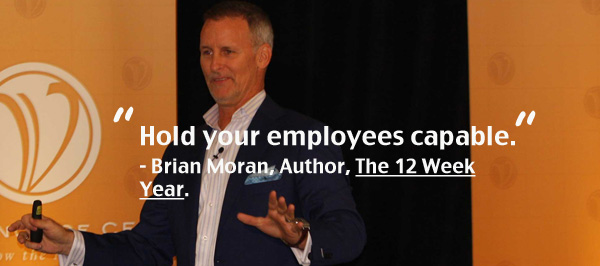
BRIAN MORAN: “The 12 Week Year”
When you think of Brian’s presentation, think blue poker chips. He gave us tools to develop clarity and focus – and a healthy sense of urgency. When you shift to a 12-week year, everything changes. And you’re sure to discover what matters most.
Nuggets from this presentation:
• Develop a repertoire of “gracious no’s” for non-essential requests.
• The moment you decide what matters most (i.e., what you need to do) will be one of your Greatest Moments.
• Move through the plan one week at a time. Peer support is important. You will quickly succeed or fail. Refine your plan. Repeat.
• Learn more here.
ROBERTA OSTER SACHS: “Enhance Your Executive Presence: Tools to Fuel Your Confidence and Impact”
When you’re getting ready for a big sales pitch, think about Roberta’s presentation. This Emmy Award-winning journalist and leadership trainer taught us about the science behind “Power Posing” and gave us mindfulness tools to enhance our productivity and health.
Nuggets from this presentation:
• Executive Presence Pillars:
1. Gravitas (ability to recognize others’ emotions)
2. Communication (*listening* skills)
3. Appearance (physical health)
• Feeling stressed or not confident. Practice your best power pose!
• Meditation matters. And mindfulness makes you smarter.
• Learn more here.
GREG MCKEOWN: “Essentialism: The Disciplined Pursuit of Less”
Need inspiration to de-clutter your life? Think about Greg. This superbly hilarious professional from across the pond is a New York Times and Wall Street Journal best-selling author and founder and CEO of THIS Inc. He gave us the inspiration to pursue less to reclaim control of our own choices about where to spend our precious time and energy. Or said another way, to pursue a closet filled only with joy. “Can we get a snap?!”
Nuggets from this presentation:
• Your job as CEO is to protect your ability to prioritize.
• Become more of who you REALLY are. Eliminate the non-essentials.
• Remember: It’s either “HELL, YES!” or “No.”
• Becoming an Essentialist begins with small wins.
• Learn more here.
JONAH BERGER: “Crafting Contagious”
This fast-talking New York Times best-selling author and Wharton professor showed us the science behind content that goes viral. He shared just enough data and secrets to entice us to devour his book. Genius approach, wouldn’t you say?
Nuggets from this presentation:
• Remember these three stories:
1. Secret entrance into bar / social currency
2. Blender video / inner remarkability
3. “Never say no to a panda” / story content that carries a message
• There’s power behind peanut butter and jelly. Find your trigger.
• Your homework: Read your free copy of Contagious by Jonah Berger.
Avoiding the Bermuda Triangle with Entrepreneur Avrum Elmakis
It was like a casual chat with a friend. CEO to CEO. Only he happens to run a $40 million company that in all likelihood will double its size in the next several years.
The Virginia Council of CEOs is all about quality knowledge sharing, and we weren’t disappointed as Avrum Elmakis took the stage during our recent Quarterly Luncheon.
Avrum Elmakis, CEO of TDBBS, LLC, is a self-proclaimed “business addict,” award-winning entrepreneur, strategic investor, innovator and trusted business consultant.
“Every person I meet wants to be an entrepreneur, “ said Elmakis to the large group. “We all know what it takes to do that. It takes a lot of passion and drive and risk – all those things that define who we are as entrepreneurs. That’s our first move into risk-taking. Then we become comfortable and we want to keep what we have. We become content.”
Elmakis’ advice is to join him in the world of the discontented.
Avoiding the Bermuda Triangle
Elmakis likens business contentment to the Bermuda Triangle – a place where business owners get comfortable generating a certain kind of volume and revenue. We get wrapped up in staying lean and small, and we don’t make the kinds of investments required to become a more formal organization. We hover instead of pivoting to the next revenue tier. We don’t allow our employees to take on responsibility. Our decision-making ability is paralyzed.
Sound familiar?
So how did Best Bully Sticks avoid the Triangle? “For me, an important moment was when I recognized early on the powerful concept of surrounding yourself with real quality people who are way more advanced than what you need. I started doing that in 2013, and it allowed us to fuel our growth early and break through. It’s very easy to fall into the trap of ‘I could hire this person, but the cost is too great for me.’”
A few other things we learned from Elmakis:
• A peer network is critical for an entrepreneur.
• The timing is never right. Don’t wait. Stretch yourself.
• Remember to check your company’s horizon often. Are you honoring your original intention?
• Always be able to separate emotional attachment to your business from good decision-making.
• The attraction to the excitement of a young company, the building of a team, the passion of an entrepreneur – these are things that should not be taken lightly when recruiting top talent.
What’s On Our Minds? Stinky Culture.
“If you have a bum culture, you can almost smell it.”
THINK ABOUT IT. This sentiment, expressed by Tom Laughon, co-founder of Catch Your Limit, sure rings true.
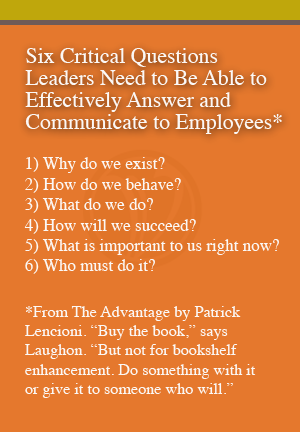 The good news, as we learned during his recent Knowledge Network presentation, is that it’s relatively easy to get rid of the stench. It begins with getting the right people on the bus and building a culture around trust.
The good news, as we learned during his recent Knowledge Network presentation, is that it’s relatively easy to get rid of the stench. It begins with getting the right people on the bus and building a culture around trust.
“The most strategic decisions a CEO should make are focused on people – checking who is on the bus and in the right seats, growing and retaining great talent and pruning all others. Where you’re going is for naught if you don’t have the right people to get you there.”
Sometimes it’s just plain nice to see a best practice in action, and that’s what Tom gave us. How do we connect with that passionate yet disparaged employee we saw on the video – the one who openly shared her concern for the business and wanted to do more to help it grow?
You have to be brave enough to hear what she has to say – all the good, the bad and the ugly about your business. You must simply listen and collectively think of ways to make a change. Then, “amazing conversations will result,“ Laughon promises us.
Remember: This is a “we” game. Listen. Get your employees involved. And witness a change.
* This “What’s On Our Minds” moment is from the VACEOs Knowledge Network Luncheon “The Company You Keep: Keys to Attracting, Growing & Retaining Talent,” presented by Tom Laughon, co-founder, Catch Your Limit Consulting.
Getting Personal with Mike Matthews, VACEOs Chair
Mike Matthews’ office, like the man himself, exudes a certain level of equanimity. Save for the few international embassy mugs he’s collected from Hankins & Anderson business trips, his ample desk, set in a sleek, contemporary setting, is clutter free. Wonderfully warm light emanates from a full wall of windows.
To know Mike on paper is to know that he has worked for Hankins & Anderson (H&A) nearly all his professional life, growing the $4 million company to $40 million after taking the helm 20 years ago. But to discover the person is to find a humble teacher and individual who is passionate about his team and his desire for continuous improvement.
He’s a doer and community builder. A free spirit. A family man. And even on the golf course, his perspective rings true to his good nature. We recently sat down with the current VACEOs Chair, and here’s what we learned.
Q: You have an engineering background, and you’re the CEO of a highly successful international architecture and engineering firm. Some folks might be surprised to know you’re a bit of a free spirit. I understand you took an interesting trip after you graduated high school.
“I took to the open road with a friend and lived in the back of a truck after high school. I wasn’t ready to go to college. I was a low-to-medium-level student, and I wasn’t ready to go back and hit the books in college. We spent 10 months traveling around the country. I saw 30 states, and I worked at a gas station in Miami, a ski resort in Vermont, and an oil field in Texas. When I came back, I was a lot more ready to be a student … not that I was a stellar student in college! But I was ready to do it and take it on.”
Q: You’re currently the president and CEO of Hankins & Anderson and you’ve been with them for nearly 28 years. Briefly describe your journey to the helm.
“When I was in college, I went to my high school drafting instructor and asked him where I could find a good summer job. He recommended Hankins & Anderson. I worked as a draftsman for the company that summer and the next. When I got out of school, I worked for another firm for four and a half years that was a spinoff of H&A. I also did a stint as a manufacturing sales rep. That position didn’t suit me well, so when I got a call from H&A to come back as a staff engineer, I took it.
I worked my way up, eventually being promoted to VP in charge of our Fairfax, Virginia, office. Only eight months into that position, I was asked to be a part of an ownership and leadership transition team. The brilliant consulting firm in charge of the transition recommended me for the job. I say ‘brilliant’ because they recommended me!” (He says very jokingly.)
Q: What management qualities does a leader need to possess to run a large and highly successful company like H&A?
“You’re going to hate me, but it’s all cliché stuff. It’s about having a vision and having everyone able to rally around that vision. It’s also about being able to inspire people and being able to communicate effectively. It’s important to be transparent.
For example, about every two weeks, we have a CEO breakfast here where we randomly ask 15 to 20 employees to attend. Everyone puts a question in an envelope for me. Some choose to stay anonymous, and that’s OK. I answer each one at the breakfast. It helps to beat the rumor mill, but more importantly, it keeps us all on the same page. Also, I’m extremely proud of the leadership team I’ve been able to bring here. They all work together and are always challenging each other.”
Q: One of your core values at H&A is a commitment to continuous learning and self-improvement. Is that one reason you decided to become an adjunct instructor at the University of Richmond?
“What’s the old adage? ‘Learn a subject, take a class. Master a subject, teach a class.’? I really enjoy teaching and interacting with the students. I’ve guest-lectured before for many years, but this class gives me an opportunity to fill a void I saw in the business school’s curriculum, and that was teaching students about professional services management – because running an architecture or law firm is very different from other types of business experiences they teach in school.
For example, an architecture firm’s key performance metrics or cost of goods sold is very different from a manufacturing company’s. How you market a professional service is very different, too. I don’t have a widget I can show you and tell you about all its features and benefits; I’ve got to sell you on trusting me as a person. Operations is very different. I’m not managing a production line that’s producing the same widget at so many per hour. Every single thing I do as a lawyer or accountant is different, so I have to approach estimating fees for my services differently.”
Q: You’ve been playing golf for years. What kind of lessons, if any, have you taken from the game?
“My approach to golf is that I don’t expect to be good at it because I don’t work at it, so there’s no pressure! The decisions I make here matter. If I miss a putt, it doesn’t really matter. Golf is a social activity for me. My CEO Forum just went to Daytona and played for our retreat. We had a blast!”
Q: You’re family man, a teacher, a highly successful businessman and the Chair of the VACEOs. How do you stay focused and productive?
A: “I have a routine every morning. I get up early in the morning, get a cup of coffee, go to the nice office I have set up at my home, sit in my really comfortable leather club chair, turn on some soulful piano music and read for an hour. It usually is a business book, but sometimes a fun book – like a grammar book. Yes, I’m a grammar wonk! Sometimes I put a fire on. I really enjoy this time I set aside for myself. Other than that, I take the day as it comes. I’m not a real planner. My staff laughs at me because sometimes I appear to wait until the last minute to do things.”
Getting Unstuck: The VACEOs Forum Experience
Let’s be honest: It’s not always business that causes the negative emotions you sometimes struggle with. Often, it’s life. To have a group of people who understand you as a human AND as a CEO is HUGE.
Imagine sitting around a table with several Inc. 5000 and RVA 25 business owners – each focused on your issue or opportunity – and finally realizing you’re not alone. Each VACEOs member has experienced this feeling during a Roundtable or Forum peer group session.
FORUM VERSUS ROUNDTABLE: WHAT’S THE DIFF?
All new VACEOs members are assigned to either a Roundtable or Forum peer group. Roundtable groups typically include 8-10 members and meet once a month for four hours. Forums, on the other hand, meet only once a quarter for a full day of discussion.
The biggest difference between a Roundtable and Forum is the type of CEOs sitting around the table. A typical Forum member leads a more complex business that may have multiple locations and 75 or more employees. Forum groups typically include only eight members and require the participation of a skilled facilitator to ensure these high-horsepower individuals stay on track.
“It’s a slightly different altitude because of the complexity or scope of the business,” he adds. “The management and hiring issues and competitive strategies are just a little bigger, but the business issues are remarkably similar,” explains Randy Wyckoff, VACEOs Forum Facilitator.
No matter the type of meeting – Roundtable or Forum – each calls for strict adherence to confidentiality and to the Gestalt Language Protocol. (The guiding principle of the Gestalt Language Protocol is to never give advice, but to share related experiences instead. (Read more.)
THE FORUM EXPERIENCE: BECOMING UNSTUCK
Forums quickly become a safe haven – a place to vent, ask questions, release fears and build lifelong friendships. During each quarterly day-long meeting, several members present personal or work challenges to the group.
It’s the facilitator’s responsibility to ensure the agenda is set well before the meeting occurs and to make sure the meeting and attendees follow Gestalt processes and principles. Another important role the facilitator may play is that of coach. The ultimate goal is to help the CEOs presenting their challenges get “unstuck.”
 “The coach works with the presenter to set the tone for the discussion,” says Randy Wyckoff, who is also a non-profit strategy consultant and coach. “I help the presenter through the process of identifying and defining the issue. I also help them clarify anything they specifically don’t want brought up during the discussion; for example, they may have tried a specific solution to the challenge already, so they don’t want to hear about experiences that include that specific approach. I also help the presenter talk about their emotional reaction to the issue – how the issue makes them feel.”
“The coach works with the presenter to set the tone for the discussion,” says Randy Wyckoff, who is also a non-profit strategy consultant and coach. “I help the presenter through the process of identifying and defining the issue. I also help them clarify anything they specifically don’t want brought up during the discussion; for example, they may have tried a specific solution to the challenge already, so they don’t want to hear about experiences that include that specific approach. I also help the presenter talk about their emotional reaction to the issue – how the issue makes them feel.”
Opening up emotionally and honestly is how members get the most out of the Forum experience. “If you come into a meeting guarded or not willing to open up, then you’re limiting your experience with the group,” says Tom Ficklin. He’s a VACEOs Forum Facilitator, a certified Christian Life Coach and a soon-to-be International Coach certificate holder.
“In the coaching world, we live for the ‘aha!’ moments,” he explains. “It’s tough for executives who are at a high level to talk about what they do with their spouse or accountant or attorney. When they get into a Forum and find out others have been down a similar path or share similar experiences, you see lights come on, and you see them think, ‘Ok, I’m not the only one.’ Then they begin to take in the experiences of the others and they begin to see how to get unstuck. They see the direction. They have a turn signal. It’s about finding the next step and taking it with a level of confidence.”
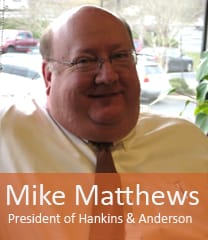 Mike Matthews, president of Hankins & Anderson and a longtime Forum member, has found confidence and friendship in his peer group.
Mike Matthews, president of Hankins & Anderson and a longtime Forum member, has found confidence and friendship in his peer group.
“They all have the same responsibilities that I have – the same difficulty in making decisions,” says Matthews. “There’s something about being with a group of people who do what you do. You don’t often find that. It’s very rewarding. When you’re talking about something, you don’t have to explain it in context. They get it. It’s great to have those conversations. I think that being a part of a Forum and a member of the Council has made me more confident in my decision-making.”
Matthews says his group truly enjoys their time together. “One Forum member said, ‘You know what? Even if we didn’t have presentations, I would still want to meet every quarter.’ I think that speaks volumes about how close we are as a group and how much value we find in the peer group experience.”
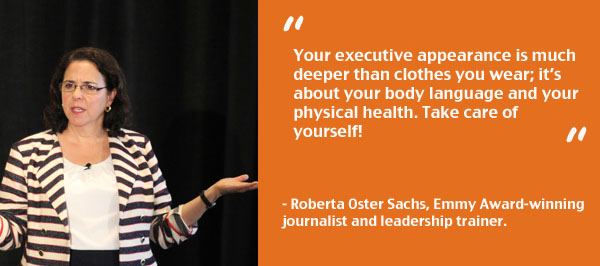

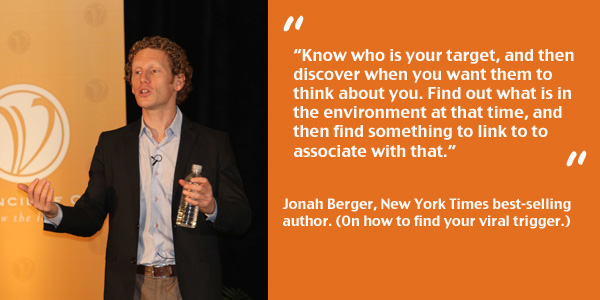
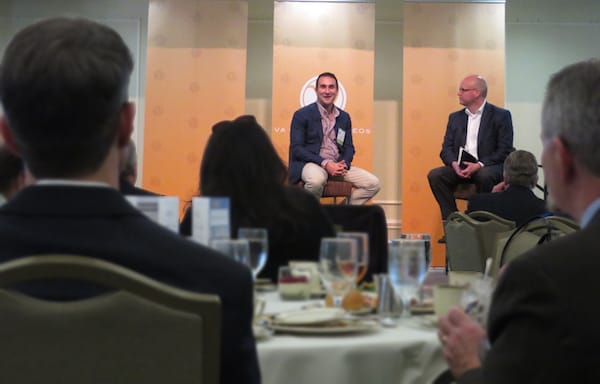
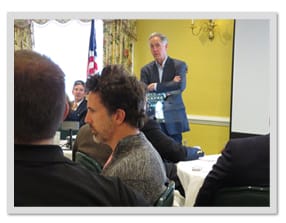

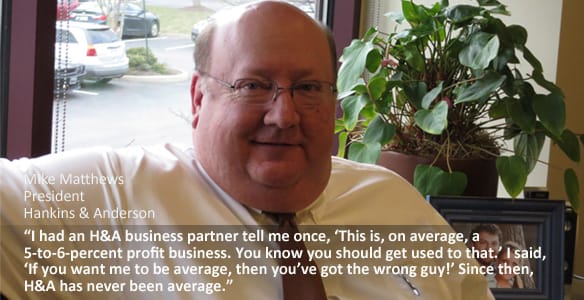
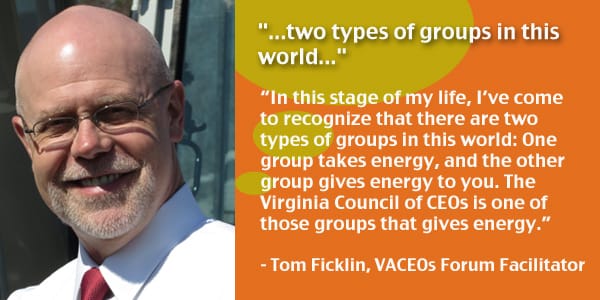
Recent Comments